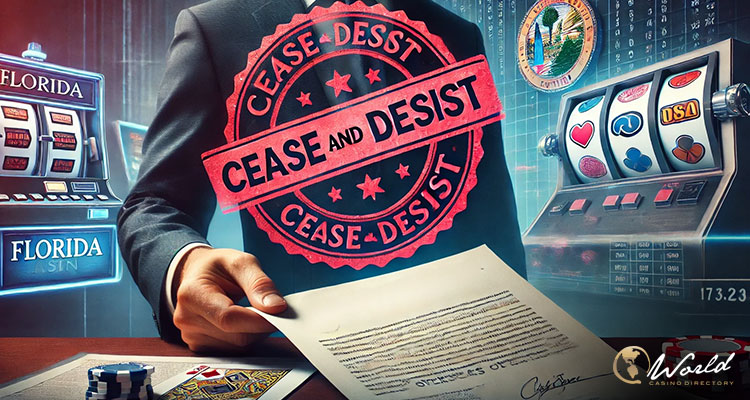The Florida Gaming Control Commission (FGCC) has taken decisive action against three overseas gambling operators accused of illegally running online sports betting, casino games, and horse racing operations accessible to residents of Florida. The commission issued cease-and-desist orders to the parent companies of BetUS, Bovada, and MyBookie, demanding that they halt all illicit activities targeting Floridian gamblers.
Cease-and-desist orders issued to overseas operators:
The companies involved include Milvus Ltc (operating BetUS.com.pa), Harp Media B.V. (operating Bovada.lv), and Gaming Services Provider N.V. (operating MyBookie.ag). These operators are accused of running websites that facilitate illegal wagering on various types of gambling, from sports betting and horse racing to casino games such as blackjack, roulette, and poker. The Florida Gaming Control Commission made it clear in its cease-and-desist letters that the websites involved are in direct violation of state law, specifically regarding unauthorized gambling activities.
Florida’s strict gambling laws define these actions as felonies. The cease-and-desist orders explicitly mention that these operators are accepting illegal wagers on sports events, including point spreads and moneylines, as well as futures and proposition bets. Moreover, the operators are engaging in unauthorized online casino activities and promoting illegal lottery-style games, such as cash prize giveaways and deposit-matching promotions. These activities are considered felonies under Florida law, and the FGCC has made it clear that action will be taken against anyone facilitating such illegal operations.
Ross Marshman, the Executive Director of the FGCC, highlighted the tight regulation of gaming activities in the state. “Gaming, both land-based and online, is strictly regulated in Florida. For example, when it comes to slot machine gaming, counting the eight legal, state-licensed slot machine businesses, and the six tribal gaming locations currently operated by the Seminole Tribe of Florida, there are only fourteen legal slot machine businesses in Florida. The only online sportsbook operating lawfully in Florida is the Seminole Tribe of Florida’s Hard Rock Bet. Anyone in Florida betting on the Big Game needs to know this. Bettor beware.” Marshman stated in the regulator’s press release (pdf).
The economic impact of legal vs. illegal gambling:
One of the driving forces behind Florida’s crackdown on illegal gambling is the significant economic impact that legal gaming generates for the state. Revenue from licensed gambling businesses in Florida contributes heavily to state-funded programs. For instance, in 2024, the state’s Educational Enhancement Trust Fund received over $240 million in tax revenue from legal slot machine operations alone. Additionally, the Seminole Tribe of Florida is expected to contribute no less than $2.5 billion over the next five years, funds that will be used for vital state initiatives such as water quality improvements, infrastructure development, and land conservation efforts.
Illegal gambling, in contrast, does not provide any of these benefits to the state. The FGCC made it clear that these unauthorized activities divert money away from legitimate businesses and state programs, undermining Florida’s regulated gambling market and placing consumers at risk.
Florida’s crackdown is not an isolated effort. Other states are also working to curb the activities of illegal gambling operators. Recently, the Michigan Gaming Control Board (MGCB) issued a cease-and-desist order to MyBookie.ag, which, like the operators in Florida, was found to be illegally offering online gambling services to Michigan residents. The MGCB’s Executive Director, Henry Williams, commented on the issue, emphasizing the importance of protecting consumers and ensuring compliance with state gambling laws. “Our investigation into MyBookie.ag found that their operations were accessible to Michigan citizens, which violates state laws,” Williams stated, reinforcing the importance of safeguarding legal gaming operations.
Bovada, another operator targeted by various state regulators, has already withdrawn from several U.S. markets, including 17 states and Washington, D.C., after receiving cease-and-desist letters. More recently, it restricted access in New Hampshire following a similar action by the New Hampshire Lottery Commission.
The national crackdown on illegal gambling operators is becoming increasingly common. Regulators are paying close attention to online gambling sites that operate without the necessary licenses, particularly those based overseas. These operators often fail to comply with local laws, posing significant risks to both gamblers and state economies. As more states become aware of the damage caused by illegal gambling, it is expected that enforcement efforts will continue to ramp up.



